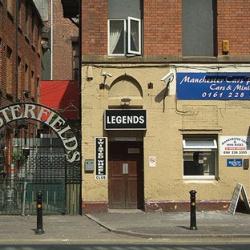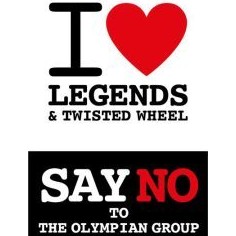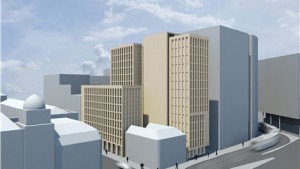Iconic nightclub under threat
Article published: Friday, February 24th 2012
Legends, one of the city’s most famous alternative LGBTQ venues and the home of Northern Soul, is under threat of demolition to make way for a hotel. Plans to tear down the building have met with vigorous opposition, with campaigners pointing to its vital importance for Manchester’s independent LGBTQ culture.
News that the site, once home to the famous Northern Soul club Twisted Wheel, could be torn down and replaced by a 330-room ‘Motel One’ chain hotel emerged following the purchase of the building by London-based developers The Olympian Group late last year.
Julian Lyons, current owner of Legends and the adjacent International Hotel, had intended to purchase the property and keep both venues open after the original landlords went into administration in 2010. But developers bought the property in a ‘sold prior’ deal before the plot was put up for auction with an offer 40 per cent higher than the expected auction price, and Lyons has been given notice to leave at the end of 2012.
As the Twisted Wheel the club had a pedigree of bringing huge American acts over the Atlantic, such as Ike and Tina Turner, John Lee Hooker and Edwin Starr, and is reputed to be where the term Northern Soul was first coined. The venue became Legends and has continued in various forms since 1964, when the Twisted Wheel moved to Whitworth Street.
More than just another nightclub
The Save Twisted Wheel/Legends campaign, which involves northern soul lovers, regular customers, prominent members of the LGBTQ community and some Labour councillors, has already received press attention and expects to increase its following in the coming weeks. Media coverage however has not met with universal approval by campaigners, with some citing neglect of the venue’s importance as a home of alternative LGBTQ culture.
 Geoff Stafford of Facts About Manchester Pride said Legends is “a place that caters to many people who feel that they don’t fit into the little ‘pink pound’ bubble that is Canal Street – it’s incredibly important for that reason.”
Geoff Stafford of Facts About Manchester Pride said Legends is “a place that caters to many people who feel that they don’t fit into the little ‘pink pound’ bubble that is Canal Street – it’s incredibly important for that reason.”
Recent years have seen rising concern among many at the dwindling amount of space in the city for non-mainstream LGBTQ culture. Activist collective Reclaim the Scene has held alternative events in protest against what they see as an increasingly commercialised and exclusive Manchester Pride, the city’s annual celebration of gay culture.
With this latest potential loss Stafford says he feels “in some ways that this is actually an attack on people who don’t want to consume a homogenised gay lifestyle.
“In the 1980s gay bars and clubs were spread out right across the city centre and indeed there were bars in Stockport and a mixed one in Salford,” he explained. “The gay scene is far more of a ghetto now than ever before. That allows the council and marketing people to control and herd the community.”
Saving a cultural icon
Many of those involved in the campaign see Legend’s continued cultural significance to the city and the world of music – it still hosts several Northern Soul all-nighters – as the key issue which will eventually guarantee its safety by gaining listed status.
 “The Twisted Wheel is a key part of Manchester’s musical heritage and the venue in its current incarnation – Legends – is integral to the city’s diverse LGBT scene,” argued city centre councillor Kevin Peel, who supports the campaign.
“The Twisted Wheel is a key part of Manchester’s musical heritage and the venue in its current incarnation – Legends – is integral to the city’s diverse LGBT scene,” argued city centre councillor Kevin Peel, who supports the campaign.
The Olympian Group are yet to act on their proposal, and have not submitted a planning application to Manchester City Council. Campaigners hope that a groundswell of support may still save the beloved venue.
“We’ve got to be about more than budget hotels and generic office blocks if we want to remain a truly world class city and part of that has to be preserving cultural icons like this,” said Peel.
He continued: “I hope many more people join our campaign to save Legends / The Twisted Wheel from demolition to put pressure on the developers to drop their plans or have them rejected by the planning committee when the application comes forward.”
When contacted the Olympian Group told MULE that their plans were not finalised and they were considering options and feedback from stakeholders.
A spokesperson said they were “assessing all our options for the site, including the retention of the existing basement structures. This could…include a continuation of the presence of a nightclub or live music venue on the site, or be used as part of an alternative leisure facility associated with the proposed new hotel.”
Tom Barlow
Campaigners are encouraging people to write to the directors of The Olympian Group to let them know about their concerns, join the campaign on Facebook for updates, and to sign the petition
Manchester Mule are currently looking for new editors – check out the blog post here for details
More: News
Comments
-
[…] » Iconic nightclub under threat – MULE. Share this:TwitterFacebookEmailLinkedInLike this:LikeBe the first to like this post. This entry […]
Pingback by » Iconic nightclub under threat – MULE | Thomas Barlow on February 26, 2012 at 2:49 pm -
‘In the 1980s gay bars and clubs were spread out right across the city centre and indeed there were bars in Stockport and a mixed one in Salford,” he explained. “The gay scene is far more of a ghetto now than ever before. That allows the council and marketing people to control and herd the community.’
So if this club has to move it could help reverse this ghetto effect as the location is within a stone’s throw of Canal St.
Surely that’s a good thing for those concerned about the ghetto effect.
There are plenty of vacant buildings and basements all over greater Manchester which could house this club.
Comment by pete on February 26, 2012 at 11:18 pm -
“There are plenty of vacant buildings and basements all over greater”
Please can you give some examples?
Comment by Greg on February 27, 2012 at 3:59 pm
The comments are closed.




